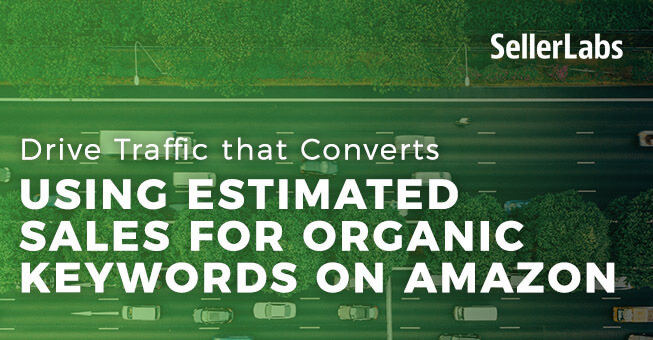Drive Traffic that Converts Using Estimated Sales for Organic Keywords on Amazon

As sellers strive to drive traffic that converts to Amazon product listings, they sometimes fail to consider that not everyone that lands on a listing buys. Are you optimizing for Amazon organic keywords that actually convert?
In Jennifer’s blog post on Quantify this month, she revealed some of the insights you can glean from Quantify today about customer buying cycles.
As she pointed out, buying cycles are patterns of buying. And a cycle could take place over the course of a week, or a month, or months. Understanding if buying patterns exist can help you predict when to invest in promotions and when to launch other products, and much more.
But one valuable piece of information she pointed out was about pairing your buying cycle research to something Scope excels at: keyword performance.
When you think about what keywords do for a listing, it’s really all about traffic. But traffic itself isn’t as valuable as converting traffic. Not just bringing shoppers—but bringing shoppers who are ready to purchase.
In Scope, you can track keywords on their own. By doing so, you see its score (or strength, based on volume and sales rank), search volume, CPC bid, and the total number of products that rank for the term. However, if you view a keyword from the product you’re tracking, you also see the Position and the Estimated Sales.
Which Search Terms Bring Traffic that Converts?
First, take a look at the estimated sales figure for keywords you track. Estimated Sales is an interesting metric. My advice: use the Estimated Sales metric as a comparative tool, to weigh the performance of various keywords. But it helps you answer this question, “What search terms bring the converting traffic?”
Comparing keywords to one another can help you determine if there are differences between phrases and terms used by browsers vs. buyers.
The estimated sales number is calculated over the past 30 days but remember that it’s an estimate only. Once you’ve identified the keywords that are performing, you need to ensure you’re showing up when buyers are using them.
Am I Ranking for the Right Search Terms?
One of the most volatile parts of selling on Amazon is organic ranking. And keyword position helps you see where your product ranks for various keywords. This is important to keep an eye on, but expect that this is going to change as new products enter (and old products are discontinued) in the giant, dynamic behemoth that is Amazon.
Use this metric—with estimated sales—to determine if you’re fully optimized for the right traffic. By optimizing your listing for the keywords that convert, you will drive your position up for your targeted keywords. You should also see your estimated sales increase.
When you focus on optimizing for converting traffic, you will attract more of the shoppers who are ready to buy—instead of window shoppers.
Fully Optimized? Peek at Keyword Performance Over Time.
If there’s one thing you can bet on with Amazon, it’s that everything is going to change, and change often. So don’t get complacent—keep tracking keywords and their performance over time. Looking at a product’s page in Scope, you’ll be able to see graphs for performance as well as the keywords that are your true workhorses, and those that are just a flash in the pan.
Are you looking to take your keyword game to another level? If so, then check out Seller Labs Pro, which is a full suite of Amazon tools to help you discover and implement the right keywords for your products—for both organic and paid search.

Ashley is an SEO & Digital Marketing Specialist and Founder of Kochans Consulting, also, a self-proclaimed die-hard SEO nerd. When she's not maximizing organic traffic, she's cooking organic meals, practicing yoga, or oil painting.






